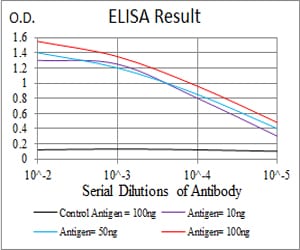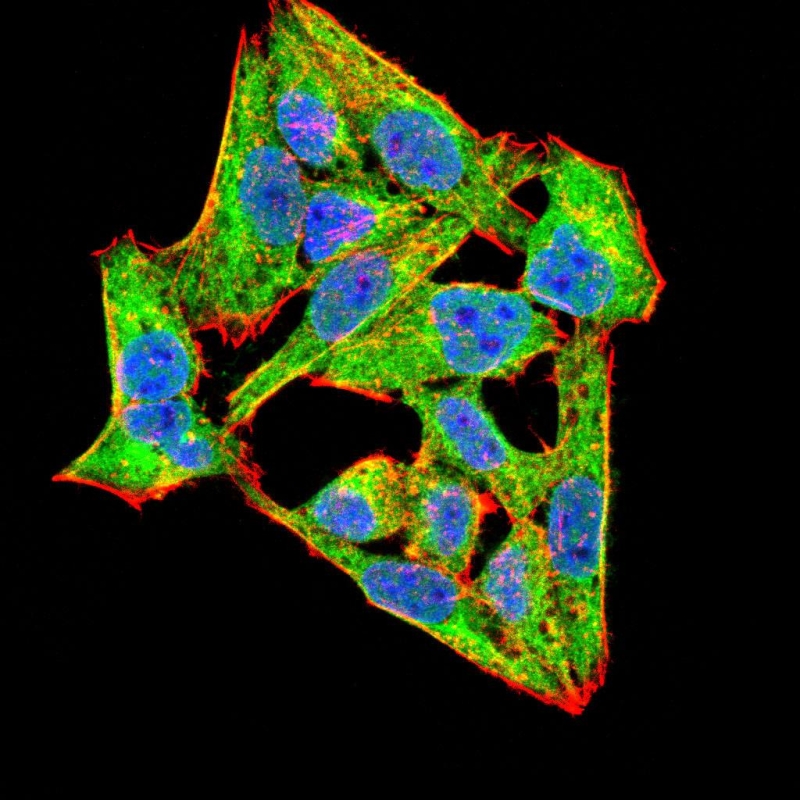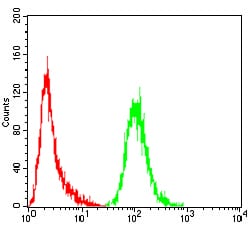


| WB | 咨询技术 | Human,Mouse,Rat |
| IF | 咨询技术 | Human,Mouse,Rat |
| IHC | 1/200 - 1/1000 | Human,Mouse,Rat |
| ICC | 1/200 - 1/1000 | Human,Mouse,Rat |
| FCM | 1/200 - 1/400 | Human,Mouse,Rat |
| Elisa | 1/10000 | Human,Mouse,Rat |
| Aliases | KOX; KOX-1; RENOX |
| Entrez GeneID | 50507 |
| clone | 3H2G11 |
| WB Predicted band size | 67kDa |
| Host/Isotype | Mouse IgG1 |
| Antibody Type | Primary antibody |
| Storage | Store at 4°C short term. Aliquot and store at -20°C long term. Avoid freeze/thaw cycles. |
| Species Reactivity | Human |
| Immunogen | Purified recombinant fragment of human NOX4 (AA: 210-310) expressed in E. Coli. |
| Formulation | Purified antibody in PBS with 0.05% sodium azide |
+ +
以下是关于NOX4抗体的3篇参考文献示例(内容为模拟概括,非真实文献):
1. **"NOX4 in Renal Fibrosis: Role of Antibody-Based Detection"**
*作者:Smith A, et al.*
摘要:研究利用特异性NOX4抗体证实其在糖尿病肾病肾小管间质纤维化中的高表达,并探讨其通过ROS信号通路促进纤维化的机制。
2. **"NOX4 Antibody Validation in Cardiac Hypertrophy Models"**
*作者:Zhang L, et al.*
摘要:通过Western blot和免疫组化验证NOX4抗体的特异性,发现其在压力超负荷诱导的心肌肥厚组织中表达上调,与氧化应激损伤相关。
3. **"Targeting NOX4 in Cancer: Antibody Localization Studies"**
*作者:Wang Y, et al.*
摘要:研究使用NOX4抗体定位肿瘤微环境中的表达模式,揭示其在胶质瘤血管生成中的作用,并评估其作为治疗靶点的潜力。
如需真实文献,建议通过PubMed或Web of Science检索关键词“NOX4 antibody”,筛选近年的实验研究或抗体验证类论文。
**Background of NOX4 Antibodies**
NADPH oxidase 4 (NOX4) is a member of the NOX family of enzymes that generate reactive oxygen species (ROS) as their primary function. Unlike other NOX isoforms, NOX4 is constitutively active and produces hydrogen peroxide (H₂O₂) rather than superoxide. It is widely expressed in tissues, including kidneys, blood vessels, and lungs, where it plays roles in cellular signaling, differentiation, and stress responses. Dysregulation of NOX4 is implicated in various pathological conditions, such as fibrosis, chronic kidney disease, cancer, and cardiovascular disorders, due to its dual role in redox-dependent physiological regulation and oxidative stress-mediated damage.
NOX4 antibodies are essential tools for studying the expression, localization, and function of this enzyme in both normal and diseased states. These antibodies enable researchers to detect NOX4 protein levels via techniques like Western blotting, immunohistochemistry, and immunofluorescence. Specific NOX4 antibodies help distinguish it from other NOX isoforms, which is critical given their structural similarities but divergent roles.
Recent studies highlight NOX4 as a therapeutic target, driving demand for high-quality antibodies to validate its involvement in disease mechanisms or assess the efficacy of NOX4 inhibitors. However, challenges remain, including ensuring antibody specificity and optimizing detection in complex tissues. Despite this, NOX4 antibodies remain pivotal in advancing research on oxidative stress-related diseases and potential treatments.
×